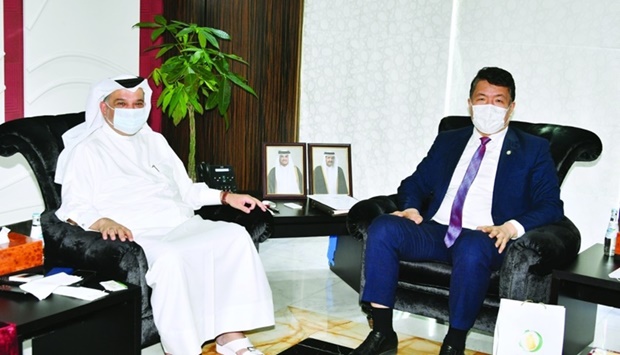Officials of Qatar Chamber and the Islamic Organisation for Food Security (IFOS) held a meeting Wednesday aimed at enhancing co-operation between both institutions.
Qatar Chamber board member Mohamed bin Ahmed al-Obaidly, who is concurrent chair of the chamber’s Food Security Committee, and IFOS general director, Professor Yerian A Baidaulet, also discussed ways for promoting mutual investments in the agriculture and food sectors between the Qatari private sector and its counterparts in the IFOS’ 36 Islamic member countries.
Al-Obaidly underscored the importance of cementing co-operation among Islamic states in food security, stressing the need for Islamic economies to open up to the international community and build strong relationships in agriculture and food industries that allow the private sector to play an important role in enhancing food security in Islamic countries.
He also assured the importance of having a general accord governing the co-operation between the various parties to boosts trade and investment exchange in the field of food security, noting the need to support agricultural investments and assist producers in the marketing process.
Baidaulet lauded the development of Qatar’s food security sector, pointing out that IFOS seeks to foster co-operation relations with Qatar Chamber to encourage Qatari investors to invest in the food industries of member states.
He said IFOS aims to provide expertise and technical know-how to member states on various aspects of sustainable agriculture, rural development, food security, and biotechnology.
IFOS also works to assess and monitor the state of food security in member states to identify emergencies and provide social safety nets and humanitarian assistance through food security reserves.
Baidaulet also said IFOS seeks to co-ordinate, formulate, and implement common agricultural policies, such as the exchange and transfer of appropriate technology and public food management systems.
IFOS also addresses problems posed by desertification, deforestation, erosion, and salinity, and mobilises and manages financial and agricultural resources to enhance food security, he added.
Qatar Chamber board member Mohamed bin Ahmed al-Obaidly, who is concurrent chair of the chamber’s Food Security Committee, and IFOS general director, Professor Yerian A Baidaulet, also discussed ways for promoting mutual investments in the agriculture and food sectors between the Qatari private sector and its counterparts in the IFOS’ 36 Islamic member countries.
Al-Obaidly underscored the importance of cementing co-operation among Islamic states in food security, stressing the need for Islamic economies to open up to the international community and build strong relationships in agriculture and food industries that allow the private sector to play an important role in enhancing food security in Islamic countries.
He also assured the importance of having a general accord governing the co-operation between the various parties to boosts trade and investment exchange in the field of food security, noting the need to support agricultural investments and assist producers in the marketing process.
Baidaulet lauded the development of Qatar’s food security sector, pointing out that IFOS seeks to foster co-operation relations with Qatar Chamber to encourage Qatari investors to invest in the food industries of member states.
He said IFOS aims to provide expertise and technical know-how to member states on various aspects of sustainable agriculture, rural development, food security, and biotechnology.
IFOS also works to assess and monitor the state of food security in member states to identify emergencies and provide social safety nets and humanitarian assistance through food security reserves.
Baidaulet also said IFOS seeks to co-ordinate, formulate, and implement common agricultural policies, such as the exchange and transfer of appropriate technology and public food management systems.
IFOS also addresses problems posed by desertification, deforestation, erosion, and salinity, and mobilises and manages financial and agricultural resources to enhance food security, he added.

